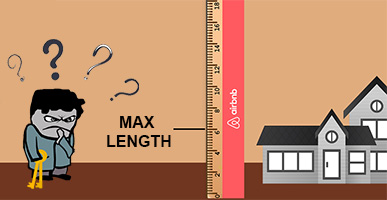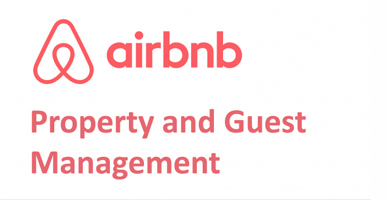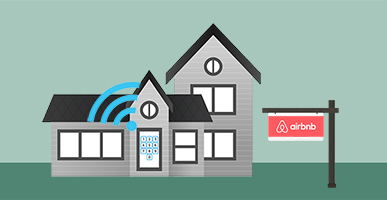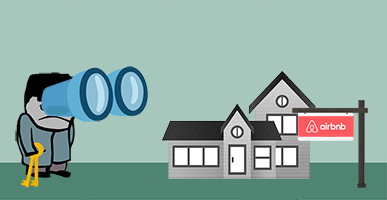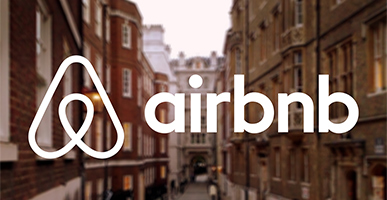
Short-term lettings, the latest super trendy and lucrative way of letting property, whether you’re a BTL landlord, or just an average Joe with a spare room/house.
Companies like Airbnb have caused a surge in popularity with short-lets; they’ve made it possible for anyone with property to generate between 30% to 100% more than traditional long-term lets!
So, let’s talk about it…
Considering I’ve been an active – and professional – landlord for over a decade, I’m considerably late to the whole ‘Airbnb’ and ‘short-let’ party.
I’ve always been – and still am – a traditional BTL landlord. A regular and steady rental income generated from long-term tenants has been the highlight reel powering my wet-dreams ever since I got into the game. There’s nothing more appealing to me than a boring, middle-aged family man who’s glued to a stable job, and cherishes a long-term tenancy agreement.
Am I a dinosaur in the world of lettings? Am I the embarrassing dad that’s walking around with a mullet and a bumbag? I’m starting to think I might just be.
It was only as recently as late last year (2017) that I finally became fully educated on the new era of short-term lettings (i.e. Airbnb) and the riches it can bring…
Table of contents:
- What is short-term letting (Airbnb)?
- Why short-term lettings?
- Finding short-term tenants/guests (how & where to advertise)!
- Short-let Management Services (Short-lets made easy)
- Tips for successful short-term lettings
- Is short-term letting really more lucrative? How much money can I make?
- What’s the catch? Are there any disadvantages to short-term letting?
- Short-term/Airbnb Rental Agreements/Contracts
- Short-term letting requirements & regulations
What is short-term letting (Airbnb)?
“Short-term lettings” is exactly what it sounds like: a short-term letting agreement with occupants.
The term of the agreement is typically less than six months, but often it is just a few weeks, or even one night. Basically, anywhere between one night and six months, which is popular among holiday-makers (i.e. specifically for travellers looking for an alternative to hotels), travelling business folk, and those in need of a temporary pad.
In the world of short-lets and Airbnb we call occupants “guests” and landlords “hosts”
Short-term lets don’t just apply to entire single properties available for rent, but also live-in “hosts” that want to squeeze some cash out of their spare room. And that’s precisely why it’s become so popular (besides from the delicious returns, of course)!
You’ve heard of Airbnb, right? Of course you have; they’re the blue-eyed boy of the ‘PropTech’ universe!
Airbnb is an insanely popular online marketplace (think Rightmove & Zoopla) where “hosts” market their properties or spare rooms to guests available for short-term letting. Airbnb have marketed themselves so strongly that their brand name has hijacked the verb “short-lets”
Why short-term lettings (over long-term lets)?
For three primary reasons:
- It’s a relatively flexible method for homeowners/hosts to make money from spare rooms and vacant properties at any point throughout the year;
- Rates for short-lets are generally higher than traditional long-term lets, with the typical host earning up to 30% more revenue.
- If you’re lumbered with a dead-beat guest, the worst case scenario is that they’re around for a ‘short’ period of time.
That’s the general gist of it, but here you go, for a more in-depth look into the differences between long-term and short-term lets.
Finding short-term tenants/guests (how & where to advertise)!
To kick-off the process of finding short-term tenants, you can market your entire property or spare room directly on Airbnb, which will enable you to recruit and manage your own guests.
| Marketplace | Avg Price | Notes | |
|---|---|---|---|
Marketplace | Price 3% | NotesThe most popular marketplace for holiday-letsSurely no intro is required, Airbnb is the most popular holiday-let marketplace in the world. If any landlord wants to maximise their chances of filling those voids, Airbnb is a must! | More Info |
While it may not be common knowledge, I urge you not to put all your eggs in one basket, albeit a fabulous basket; Airbnb do have a few notable rivals that deserve recognition and possibly your custom.
Here’s a list of websites similar to Airbnb where you can market your property to find short-term tenants.
But please, don’t get it twisted; Airbnb should always be the first port-of-call for every self-respecting Short-let landlord that’s looking for a reliable marketing strategy (in my opinion), but it’s also worth using some of the other competing platforms in tangent to maximise exposure and bookings (i.e. to minimise those dreaded void periods), especially since you typically only pay commission on confirmed bookings! It’s a win-win.
Tips for successful short-term lettings…- High standards: expectations for short-term lets are generally higher than regular long-term lets, and that’s for a couple of reasons, but mainly because there’s a premium price paid for short-term lets, and secondly, you’re largely dealing with holiday-makers.
So my number one tip is to ensure you’re not offering a plate of slop! Have high standards in terms of service and cleanliness to ensure value and a steady flow of bookings.
- Local competition: the insane popularity of short-lets and Airbnb has meant that every man and their nan has transitioned from nobody to flamboyant “host”, so don’t be surprised if the competition in your area is filled to the brim.
Regularly assess the competition in your local area to always be competitive.
- Furnishings & Fittings: short-term lets are expected to be fully furnished and well-equipped!
- Marketing Photography: I’m often left mortified – hand over open mouth – when I scour through Airbnb and poison my eyes by exposing them to some of the dingy photos that are being used to “sell”
Photos are the single most important aspect of marketing and generating bookings, so it’s imperative not to skimp on them!
Put your iPhone down! Invest in proper professional photos of your property (FYI, they’re not that expensive, and they will pay for them self ten-fold in two shakes of a lamb’s tail), so you have tasteful wide-angled and vibrant visuals to entice the punters!
What’s the catch? Are there any disadvantages to short-term letting?
So my number one tip is to ensure you’re not offering a plate of slop! Have high standards in terms of service and cleanliness to ensure value and a steady flow of bookings.
Regularly assess the competition in your local area to always be competitive.
Photos are the single most important aspect of marketing and generating bookings, so it’s imperative not to skimp on them!
Put your iPhone down! Invest in proper professional photos of your property (FYI, they’re not that expensive, and they will pay for them self ten-fold in two shakes of a lamb’s tail), so you have tasteful wide-angled and vibrant visuals to entice the punters!
If I’ve painted a rosy picture and consequently money signs are spinning in your dilated pupils, let me Hulk-smash you back down to reality. As with all things that sound too good to be true, there are hideous and pulsating boils hidden in-between the toes of this beast, which may encourage you to say, “fuck this shit”
It must be noted that most of the issues that arise with short-term lets are mostly felt by ‘live-in’ hosts/landlords and hosts that don’t use Short-let/Airbnb management services (because they generally alleviate most of the headaches, which of course is the whole point of their service. But more management services a bit further down!).
- Short lets may bring flexibility, but they also bring uncertainty; void periods can be frequent and common, and your property will be making ZERO during those lonely times! The 30% or so premium a short-let commands can be cancelled out by the loss of income during the void periods;
- Short-term lets are expected to be fully furnished, from crockery to toilet scrubs;
- Continuing from the above point; damage, wear and tear and maintenance costs are generally high with short-term lets, especially due to the high guest turnover. However, one thing to note is that Airbnb provide ‘Host Guarantee‘, which includes property damage protection of up to $1 million USD for every host and every listing at no additional cost, so that’s pretty cool – it definitely helps curb some major concerns;
- Preparing for a constant flow of new guests can be tiring and hard-work. There can be a lot of work involved, from deep-cleaning cleaning to supplying fresh linen;
- As a host, you may have to deal with a whole range of personalities and idiots;
- The landlord/host will need to cover costs that are normally covered by long-term tenants, such as utility bills, internet, TV licence and council tax. So do the maths before making any decisions; make sure the numbers stack in your favour!
- Properties in London are restricted by the 90-day rule, which means landlords aren’t permitted to let their property for more than 90 days per year. The 90-day limit applies to both 90 consecutive days or 90 days spread throughout the year.
However, to combat the restriction, many landlords combine long-term tenancies (i.e. a 6 month tenancy) with multiple short-let tenancies (i.e. tenancies below 6 months) per year. During the long-term tenancy the landlord may achieve a lower rate compared to the short-lets, but it’s still significantly more lucrative than one long-term tenancy.
So the catch is, you always need to find one long-term tenancy (for 6 months) each year to keep a high occupancy rate and to comply with the rules.
- Short-term lets/Airbnb rental agreements, I find it all a bit hazy! I think it deserves a whole section of its own, so I will cover it in more detail below. See you there!
Short-term lets/Airbnb Rental Agreements/Contracts
It’s important to remember that websites like Airbnb are advertising platforms, they are not responsible for policing or enforcing our legal rights as hosts and guests.
Advertising platforms allow you to define your own ‘rental agreement’, which guests must agree to during booking. The agreement can include details like the house rules, check in/out details, and the penalties for any damages etc.
The only issue is that many of the terms defined in the rental agreement may not be enforceable by law. More importantly, the rights you have as a landlord/host and as an occupier/guest will depend partly on the legal type of occupation your ‘guests’ have (they’ll most likely either be a ‘tenant’ or a ‘licensee’). If you’re interested, there’s a good article on the LandlordLaw Blog which explains Airbnb renting laws in more detail.
The bottom line is, advertising platforms like Airbnb won’t accept any legal liabilities if shit hits the fan; it will be up to you (and your legal team) to resolve any issues and determine your legal rights.
I hate to do this, but I’m going to throw the usual rebuttal in your face when it comes to matters of this nature: seek your own legal advice when drafting your rental agreement (even though most Airbnb hosts don’t bother).
Short-let Management Services (Short-lets made easy)
Here, take my flannel and wipe down your sweaty brow! This whole Airbnb/short-let gig all sounds like a butt-load of hard work, and now you’re not sure if you’ve got the stomach for it.
I’m with you. So with you!
One of the major problems with being a Airbnb host/landlord is that servicing a revolving door of incoming and outgoing guests ain’t easy!
In one month a host can potentially go through several different guests, which means a lot of preparation, cleaning, and meeting & greeting.
Exasperating.
But wait! Before you throw the sweat-infused flannel into the middle of the ring, perhaps I can provide you with a glimmer of hope…
Fortunately, opportunists’ recognised the problem; they saw the gap in the market for much-needed Airbnb/Short-let management services.
They’re kind of like letting agents, but they’re so much more mothery. What they essentially do is take over the entire management of your short-let/Airbnb:
- They market & find guests
- They provide actual housekeeping services like a flush hotel e.g. deep-clean between guests, provide and replace toiletries, change the bedsheets etc.
- They meet and greet all the guests
- They attend to all repairs and maintenance issues
- Many of them even offer interior decorating services to ensure your property is always looking swanky.
- …etc
They essentially takeover everything so you do nothing! Of course, they’ll take a percentage of the rental income in return.
Airbnb management services are becoming extremely popular. I know someone that uses one, and he describes them as a “godsend”
Not only do they make short-lets stress free, but they also massively increase rental income.
However, don’t get too excited just yet. Since Airbnb management services are still in their infant stages, there are a few limitations, which may render them absolutely useless to you:
- They only manage and service entire properties (i.e. you can’t be a live-in landlord letting a spare room);
- and they currently only manage properties in major UK cities e.g. London, Manchester, Edinburgh etc.
If you’re interested in stress-free living and you have a prime piece of real estate in a major UK city, you may want to jump over to the Airbnb Management Services page to investigate further. Otherwise, you may just have to get to grips with managing your Airbnb remotely in the most efficient way.
Short-term letting requirements & regulations
Full disclaimer: I’m not an expert or qualified in short-term letting requirements & regulations, so please do your own due diligence, and consider my thoughts as nothing more than unqualified points of consideration!
Based on the research I have done, I’ve quickly arrived at the conclusion that there’s a serious lack of clarity – and therefore heaps of confusion – when it comes to short-let legislation. I imagine that’s due to the infancy of the phenomenon.
I’m sure the legal requirements will become clearer in due course, but for now, here is a list of requirements & regulations that did cross my radar:
- Occupancy type (AST Vs Holiday-let Vs Licenses)
- Assured Shorthold Tenancy (AST)
There is currently no separate legal definition or status for short-term and long-term lets. “Short-term” is just a term used to describe agreements that are less than six months in duration.The Housing Act 1988 is the main legislation that governs residential tenancies. A tenancy granted to an individual who occupies a property as their principal home will be an AST by default, so that means all the rules and regulations that apply to regular long-term tenancies will also apply to short-term lets.
However, there are exceptions, and the one which often applies to short-lets is holiday-lets. If the intent of the short-term occupancy is for a holiday/short break (essentially, if it’s not for work or business purposes), it will be excluded from the Housing Act. (source: landlordlegalsolutions.co.uk)
- Licenses
If you’re a live-in landlord and you rent out individual rooms, you will most likely be creating a license, in which case I *think* the same safety regulations that apply to holiday-lets (discussed below) will also apply for licenses. - Short-term holiday-let regulations
The following is required for short-term holiday lets:- Fire safety: The Regulatory Reform (Fire Safety) Order 2005 makes landlords/hosts responsible for taking steps to protect the people using your premises. You MUST carry out a fire risk assessment, improve fire safety measures if necessary and keep your risk assessment and safety reviews up to date. (source: keybury.co.uk)
- Gas Safety: Landlords must get their property inspected every year by an engineer registered with the Gas Safe Register and obtain a certificate. (source: landlordlawblog.co.uk)
- Furniture: all furniture and furnishings made after 1950 must carry a manufacturers label at the point of sale, which must be non detachable. (source: landlordlawblog.co.uk)
- Electrics: electric wiring and any electrical appliances provided with the property must be safe to operate. (source: landlordlawblog.co.uk)
- Assured Shorthold Tenancy (AST)
- Permission to short-term let
- Mortgage lender: check with your mortgage lender that your policy allows short-term letting. (source: towerhamlets.gov.uk)
- Insurance policy ensure you have the right type of building and contents insurance policy for short-term lettings. (source: towerhamlets.gov.uk).
Pikl, for example, are specialists in providing insurance for people who host short-term guests, like Airbnb-ers.
- Freeholder: if you are not the freeholder of the property you wish to let, check the terms of the leasehold to see if you are allowed to sub-let the property. Many leaseholds don’t permit sub-letting. (source: towerhamlets.gov.uk)
- Local authorities: Some cities have laws that restrict your ability to host paying guests for short periods. For example, your local authority may require you to obtain a licence before being permitted to let your property. Check with your local authority first to see what you are required to do in order to be compliant with short-term lettings. (source: gov.uk, Airbnb.co.uk)
- Planning permission: landlords/hosts in London must apply for planning permission from your local authorities if you short-term let your property for more than 90 nights in total during any calendar year, regardless of how many separate occasions during the year it has been let, or if you are not liable to pay council tax on the property you are letting out. (source: towerhamlets.gov.uk)
- Finances
- Tax: you know the drill :)
All profits from rental income are subject to tax laws. To determine your tax liabilities from letting, you should speak to an accountant / tax specialist!
- Tax: you know the drill :)
Disclaimer: I'm just a landlord blogger; I'm 100% not qualified to give legal or financial advice. I'm a doofus. Any information I share is my unqualified opinion, and should never be construed as professional legal or financial advice. You should definitely get advice from a qualified professional for any legal or financial matters. For more information, please read my full disclaimer.


 Landlord Products / Services
Landlord Products / Services